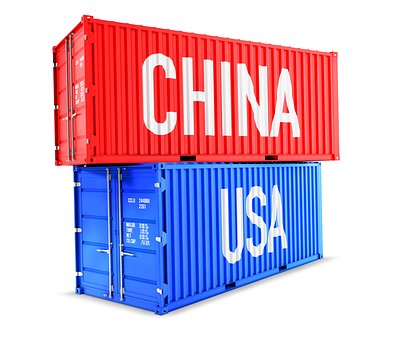The Complex Relationship between China and the United States: A Look at the Military, Global Role, and Public Opinion
The Growing Concerns over China’s Global Influence: An Analysis of US Perspectives
China and the United States are two of the most influential countries in the world, with complex political, economic, and military relationships. As these relationships evolve, it is important to examine the various factors that contribute to their complexity. In this article, we will explore the military relationship between China and the United States, China’s global role, and public opinion in the United States about China. We will also examine how these factors impact the overall relationship between the two countries.
The Military Relationship between China and the United States
China’s military strength and modernization efforts
China’s military strength has been increasing rapidly in recent years, with significant investments in modernizing its military. The People’s Liberation Army (PLA) has developed advanced weaponry, including aircraft carriers, stealth fighters, and long-range missiles. China’s military modernization has raised concerns in the United States and among its allies in the Asia-Pacific region.
The United States’ military presence in the Asia-Pacific region
The United States maintains a significant military presence in the Asia-Pacific region, which is seen by many as a way to balance China’s growing military capabilities. The United States has a number of military bases in the region, including in Japan, South Korea, and Guam. It also conducts joint military exercises with its allies in the region, including Taiwan.
Military exercises and tensions in the South China Sea
The South China Sea has been a source of tension between China and the United States, with the United States criticizing China’s construction of artificial islands in the region and its territorial claims. The United States has conducted freedom of navigation operations in the region, which China sees as provocative. These tensions have led to increased military exercises by both countries in the region, raising concerns about the potential for conflict.
China’s Global Role
China’s Belt and Road Initiative
China’s Belt and Road Initiative (BRI) is a global infrastructure development plan aimed at increasing China’s influence and connectivity with other countries. The BRI involves investments in infrastructure projects in countries across Asia, Africa, and Europe. The initiative has been criticized by some as a way for China to expand its influence and economic power.
China’s increasing influence in international organizations
China has been increasing its influence in international organizations, including the United Nations and the World Health Organization. China has used its growing economic and political power to promote its own interests and challenge the influence of Western countries in these organizations.
China’s relationship with Russia
China and Russia have developed a closer relationship in recent years, with both countries working together on a number of political and economic issues. The two countries have conducted joint military exercises and have aligned themselves on a number of international issues, including their opposition to Western interventions in Syria and their support for North Korea. The relationship between China and Russia is seen by many as a challenge to the United States’ global influence.
Public Opinion in the United States about China
Americans’ views on China’s economy and trade practices
Many Americans view China’s economy and trade practices with skepticism. Some see China’s trade policies as unfair and damaging to American industries, particularly in manufacturing. Others view China’s economic growth as a threat to American economic power.
Americans’ perceptions of China’s global role
Americans have mixed views on China’s global role. Some see China as a rising superpower that poses a threat to American interests, while others view China as a potential partner in addressing global issues such as climate change and nuclear proliferation.
Americans’ concerns about China’s military capabilities
Many Americans are concerned about China’s growing military capabilities and see China as a potential military threat to the United States and its allies in the Asia-Pacific region.
The Impact of these Factors on the Relationship between China and the United States
Tensions and conflicts in the military relationship
The military relationship between China and the United States has been marked by tensions and conflicts, particularly in the Asia-Pacific region. Both countries have increased their military presence and conducted military exercises in the region, raising concerns about the potential for conflict.
Competition for global influence and power
China’s increasing global influence and power has challenged the United States’ position as a global superpower. The United States has been critical of China’s efforts to expand its influence, particularly through the Belt and Road Initiative.
The impact of public opinion on policy decisions
Public opinion in the United States about China can have a significant impact on policy decisions. Politicians are often responsive to public opinion, particularly when it comes to issues of national security and economic policy.
Conclusion
The relationship between China and the United States is complex, with a number of factors contributing to its complexity. The military relationship between the two countries is marked by tensions and conflicts, while China’s global role and public opinion in the United States about China are also significant factors. These factors have the potential to impact the overall relationship between the two countries, and it is important for policymakers to carefully consider them when making decisions about foreign policy.
References:
- Sanger, D. E. (2023, April 14). Opinion | The United States Can’t Ignore China Anymore. The New York Times. https://www.nytimes.com/2023/04/14/opinion/china-america-relationship.html
- Wong, L. (2023, April 15). China is a ‘near-peer’ to the US in military capability, says Air and Space Forces chief. Air and Space Forces. https://www.airandspaceforces.com/china-near-peer-us-pla-military/
- Huang, C., & Lipka, M. (2023, April 12). Americans Are Critical of China’s Global Role as Well as Its Relationship with Russia. Pew Research Center. https://www.pewresearch.org/global/2023/04/12/americans-are-critical-of-chinas-global-role-as-well-as-its-relationship-with-russia/





